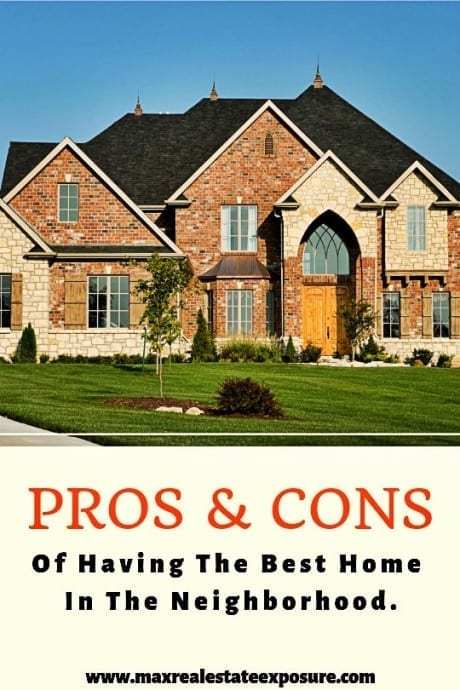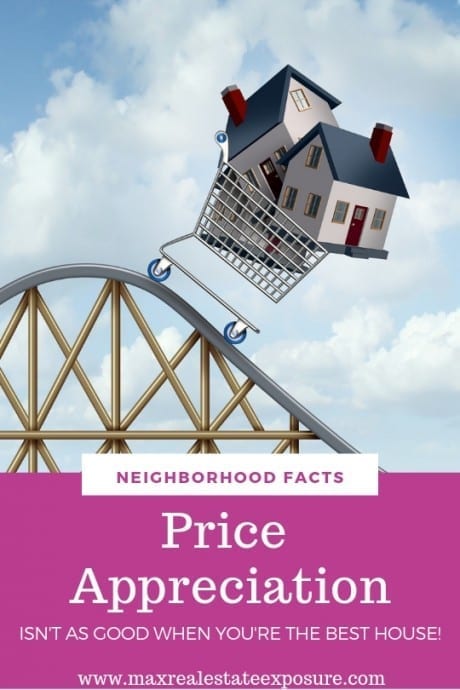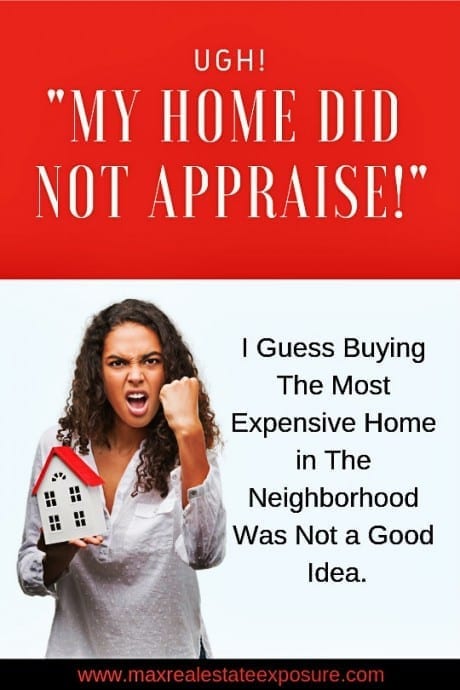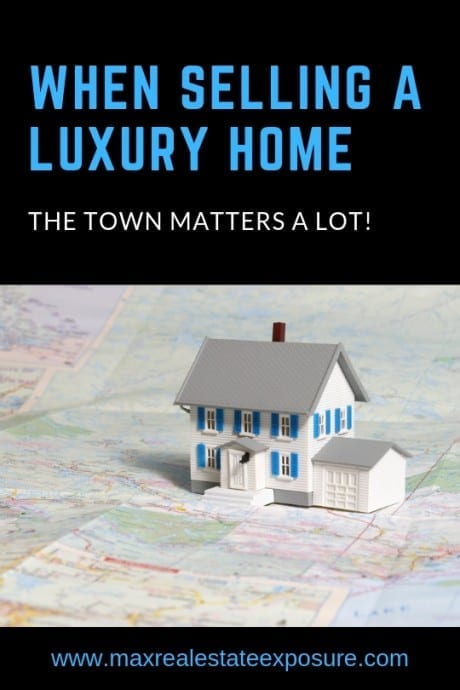Pros and Cons of Buying the Best Home in the Neighborhood
 There are few things that every real estate agent will agree on, but you can bet that most will tell you not to buy the best house in the neighborhood. But why? Well, there are multiple reasons, which we will get into below.
There are few things that every real estate agent will agree on, but you can bet that most will tell you not to buy the best house in the neighborhood. But why? Well, there are multiple reasons, which we will get into below.
However, there are also a few reasons why you might still want to avoid this common advice. For some buyers, getting the best house on the block is worth it.
Before we go into the reasons why most agents will tell you not to buy the best house, let’s look at the reasons why you might. You are the final decision maker on what house you buy as long as you have the money to buy it, after all.
You should, however, have a strong understanding of what you are getting yourself into. Understanding neighborhood values and how they will affect you should be part of your home buying due diligence.
Read on to discover the pros and cons of buying the best home in the area.
Pros of buying the best home in the neighborhood
- You are not interested in compromising. Sometimes you want the best, and if you can justify it financially, then you can certainly have it. Not everyone needs to buy a home primarily as an investment—sometimes you just want what you want and can justify potentially lower returns when it comes time to sell.
- You want to come home to the perfect house. You may not be interested in fixing things up or having to worry about making repairs, renovations or improvements. You may just want to reward yourself for all your hard work by being able to come home to the perfect home.
- The property has specific features that you cannot find in other properties. If the property has particular things that you want or need and you struggle to find them anywhere else, it may be worth buying regardless of what conventional wisdom says. For example, if you need an elevator and the home has one, your purchase will make sense to you. Homes that have certain features that are hard to come by can positively influence home buying decisions.
- You want to show off your life’s accomplishments. Let’s face it – lots of people like to embellish. Certain folks like to show off what they have achieved. A sizeable expensive house is a perfect way to do that.
Cons of buying the best home in the neighborhood
Some drawbacks come with buying the best house on the block—which is why so many Realtors agree that you should avoid doing so if you can help it. Let’s look at why so many agents feel the same way.
The value of the home will not increase at the same rate as other homes in the area.
 In most cases, when you buy a home, you can expect its value to increase over time. This is known as the appreciation rate. But the rate of increase will be much slower with the best house on the block than with other homes.
In most cases, when you buy a home, you can expect its value to increase over time. This is known as the appreciation rate. But the rate of increase will be much slower with the best house on the block than with other homes.
In fact, most of the time the worst house in the neighborhood will increase in value much more rapidly than the best home in the neighborhood.
With the best house, you are unable to make improvements that will have much effect on the value of the home. With the worst house or even a mid-range house, you have a lot more improvement options. But the best house has already been improved to the max.
With the best house, you also lose out on another value increasing situation that all the other homes in the area will enjoy—the boost in value that comes from other home sales in the area.
With a low to a mid-range house, you get a boost in property value when a higher value home is sold in your area. But when you own the highest valued home in the area, there are no other homes that can be sold to boost your value.
The principle of progression in real estate explained.
In real estate, this is what’s known as the principle of progression. The progression theory states that the value of less expensive properties will increase when they are surrounded by more expensive properties.
So if your home is worth $300,000 and is surrounded by homes that are worth $400,000, the value of a property will rise higher due to this situation.
The principle of regression in real estate explained.
On the flip side, there is what’s referred to as the principle of regression. The principle of regression states that the value of an expensive house will go down when less expensive properties surround the property. So if your home is worth $400,000 and it is surrounded by $250,000 homes, the value of your property will decrease.
Regression and progression theory are significant forces that can affect property values. It is a primary reason why buying the most expensive home in a neighborhood is often described as a mistake.
You will struggle to find a buyer.
Ok, you may be thinking, “I’ll live here for the rest of my life.” Frankly, this is what many buyers feel when they purchase a home. But most homeowners sell eventually, and some homeowners wind up selling because they have to.
Many things can happen that will make it harder to make your mortgage payments. You could lose your job or encounter other financial hardships, such as medical bills. You could need to relocate for work. Or, you could wind up getting divorced. Whatever the cause, there is always the chance that you will find yourself needing to unload the home sooner rather than later.
Most home buyers stick to purchasing homes in the middle of the range of home values. Or, they are looking for the lower end of the range so they can improve the property and re-sell it for more money.
Most buyers are not looking for the most expensive home in the neighborhood. That means you will have a much smaller pool of buyers when you start trying to sell.
Your home may not appraise at the value you are hoping for.
 For most buyers to purchase your home, they are going to need to work with a lender to get a mortgage. All lenders require appraisals to ensure that they are not lending money on properties that are overpriced.
For most buyers to purchase your home, they are going to need to work with a lender to get a mortgage. All lenders require appraisals to ensure that they are not lending money on properties that are overpriced.
As the owner of the nicest home in the area, you are in an unenviable position when it comes to the appraisal process. Appraisers are not going to value the bells and whistles in your home based on how much you enjoy them—they are going to evaluate them based on the current market.
They are also going to look closely at the surrounding neighborhood and at comparable sales. Since there are few sales to compare to when you have the nicest home, the options they have for calculating your home’s value would be limited.
If the appraiser determines your home is worth less than you think it should be worth, there is not much you can do to argue. Lenders will only lend up to the appraisal amount, which leaves you trying to sell the home for less than you would like.
You can, of course, try to challenge the appraisal but you are probably going to be fighting a tough battle you’ll unlikely win. One of the more common reasons why a home does not appraise is when the subject property is the best home in the neighborhood by far.
You are still affected by the surrounding neighborhood.
When you have the nicest home in the neighborhood, it can be easy to forget about the other homes that surround you. After all, you have your palace, so what does it matter what everyone else is doing?
Well, it turns out that it matters a lot—at least if you are trying to sell the home. The value of the homes that surround yours will help to set the value of your own home, regardless of how much you or the previous owner have invested in the property.
Buyers may avoid purchasing your home, even if they have the money if your neighborhood is less desirable than they prefer.
This is one of the reasons I counsel buyers on the importance of picking the right neighborhood. Just looking at the home is a foolish mistake.
The city or town you live in matters a lot too.
 The neighborhood is not the only thing that can have a drastic effect on home values. In fact, the city or town the property is located in will have a much more significant influence on home value.
The neighborhood is not the only thing that can have a drastic effect on home values. In fact, the city or town the property is located in will have a much more significant influence on home value.
Over the years as a Massachusetts Real Estate agent, I have seen quite a few buyers make purchasing decisions based on housing expectations.
Quite often people relocating from other parts of the country can have sticker shock when they get here. They are used to living in a huge home in some other state.
Upon arrival, they find out that they can’t get anywhere close to the home they had in the towns they want to live in.
Some of these buyers realize it pretty quickly. If they have kids, quite often they will make sacrifices and opt for a smaller home in one of the best communities.
These folks are actually making a sage purchase decision in the long run. Why? When it comes time to sell the town will have a significant impact on the value of their home. Homes in the best towns have the highest appreciation.
School systems are often a dominant driving force for this. Property values in cities and towns with the best schools often have a value correlation.
Some buyers, however, opt for going to a less desirable community to get the large home they want.
Unfortunately, this can be very painful when it comes time to sell. I will give you a perfect example. In my home town of Hopkinton Massachusetts, the same home located next door in Milford Massachusetts could be worth $150,000-$200,000 less.
On the surface you might think to yourself – wow I can get the same home in the adjacent town for $600,000 that will cost me $800,000 in Hopkinton. What buyers don’t realize is that a home selling for $600,000 in Hopkinton is a dime a dozen. There will be tons of people looking to purchase a $600,000 home. There will be far more buyers than sellers for this type of home.
The $600,000 home in Milford will be the exact opposite. You will be hard pressed to find a buyer. Buying the most expensive home in a town that doesn’t have many buyers is equally dumb if not more so. Selling a luxury home in a city or town that doesn’t support luxury properties can be very challenging.
When looking at homes, you need to decide if appreciation matters that much or not. For some buyers, they would rather sacrifice long term wealth accumulation for better living day to day.
Even if you can sell the property, it may take a long time to find a buyer.
All of the challenges that come with selling the nicest home in the neighborhood mean that when you do try to sell, it is going to take a while. That may be fine with you if you are in an excellent financial position, but if you are in an awkward position, the lengthy sales time could prove uncomfortable.
There are only so many potential buyers for the nicest home in the area. These luxury home buyers are going to be difficult to find and attract to your property. Your real estate agent is going to have to work hard, real hard, to find the right kind of buyer and to get the transaction completed.
Final thoughts
The home you purchase will have long term ramifications including your happiness as well as long term appreciation. Hopefully, you now have a better understanding of the pros and cons of buying the best property in the neighborhood.
Additional Helpful Home Buying Advice
- Closing checklist for buyers via Danny Margagliano.
- Why you may want to avoid a condo via Kevin Vitali.
- Why is a final walk through so important via Sharon Paxson.
- What to do after closing on your home via Michelle Gibson.
Use these additional resources to make the best decisions possible when you are buying a home.
About the Author: The above Real Estate information on buying the best house in the neighborhood: the pros and cons were provided by Bill Gassett, a Nationally recognized leader in his field. Bill can be reached via email at billgassett@remaxexec.com or by phone at 508-625-0191. Bill has helped people move in and out of many Metrowest towns for the last 32+ years.
Are you thinking of selling your home? I have a passion for Real Estate and love to share my marketing expertise!
I service Real Estate sales in the following Metrowest MA towns: Ashland, Bellingham, Douglas, Framingham, Franklin, Grafton, Holliston, Hopkinton, Hopedale, Medway, Mendon, Milford, Millbury, Millville, Natick, Northborough, Northbridge, Shrewsbury, Southborough, Sutton, Wayland, Westborough, Whitinsville, Worcester, Upton and Uxbridge MA.